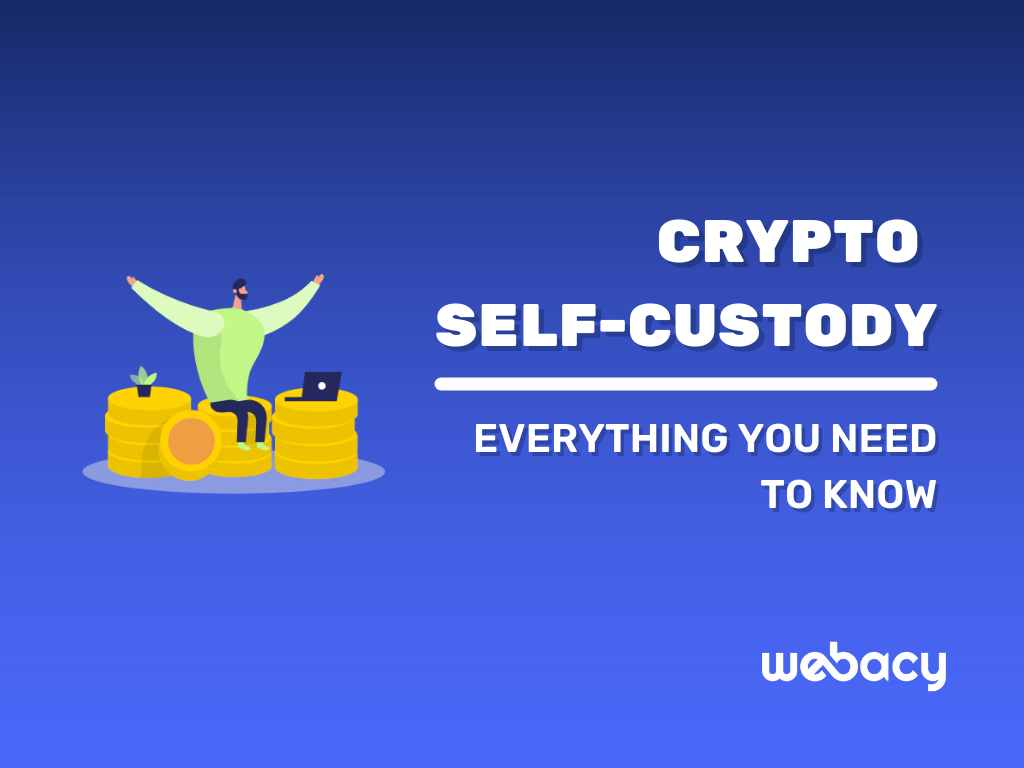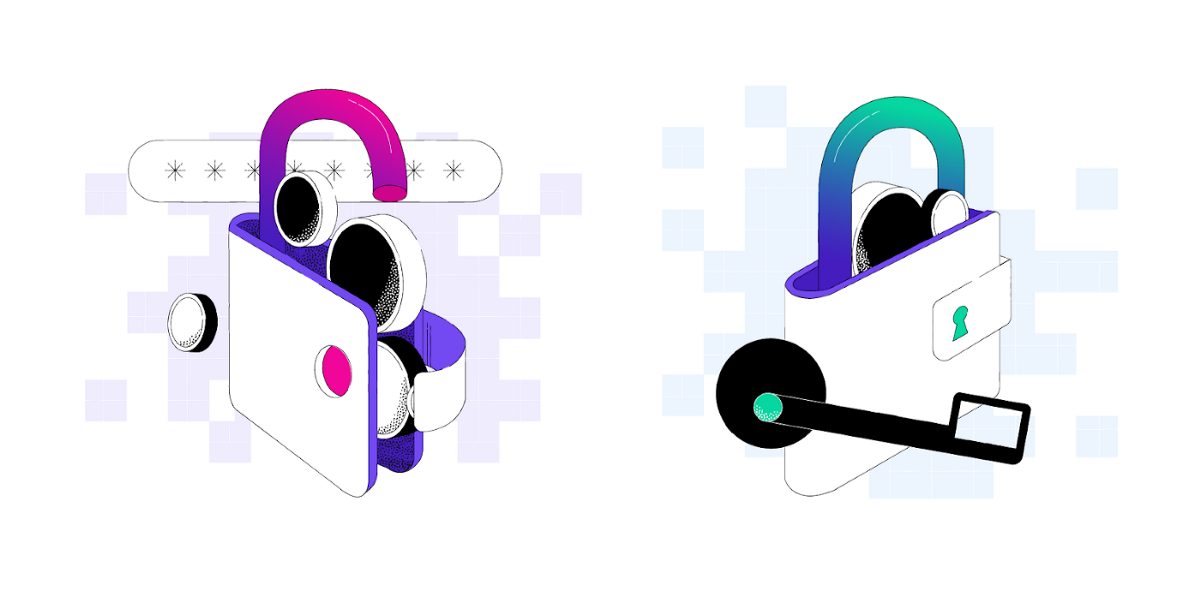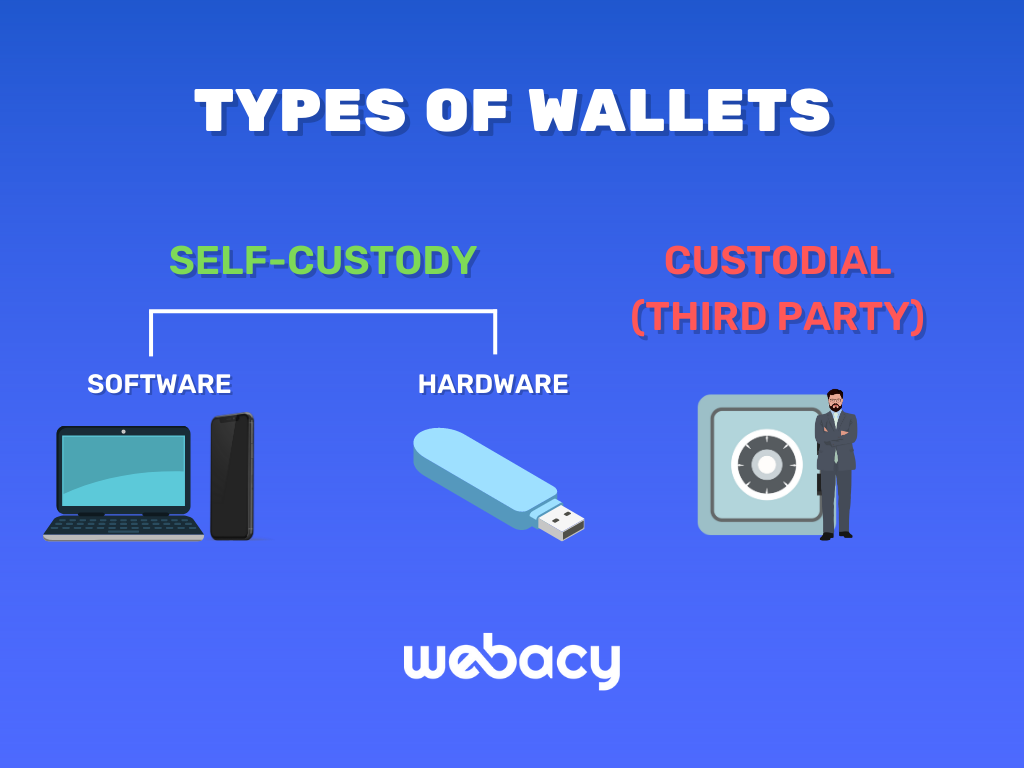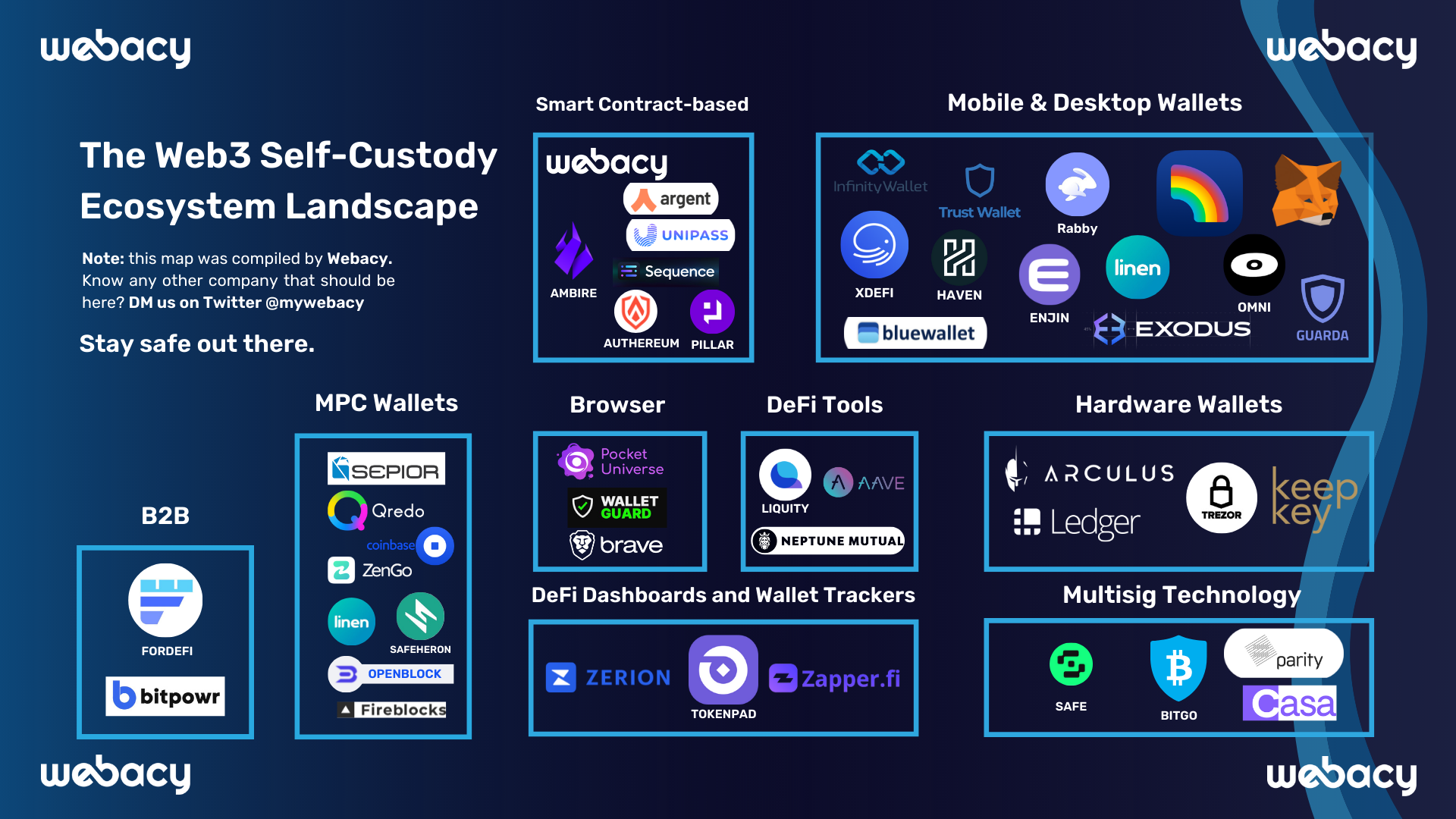Crypto Self-Custody: Everything You Need To Know
Learn about the benefits of self-custody and how to keep your crypto assets safe with this comprehensive guide.

In the world of cryptocurrency, self-custody is an essential practice for anyone who wants to have full control and ownership of their digital assets. Self-custody means storing your crypto in a wallet where you control the private keys and seed phrases, instead of relying on a third-party custodian like an exchange. But what exactly is self-custody, and why is it important?
In this article, we will explore the ins and outs of self-custody for cryptocurrency, including the different types of wallets available, the pros and cons of self-custody, and the best practices for keeping your crypto safe. We will also discuss the different types of crypto custody, including hot and cold wallets, and take a closer look at some of the most popular self-custody wallets on the market.
If you are new to the world of crypto, or if you are an experienced trader looking to up your security game, this article is for you. By the end of this guide, you will have a solid understanding of self-custody, and the knowledge you need to keep your crypto assets safe from hacks, scams, and other threats. Let's dive in!
Importance of self-custody
Self-custody is crucial for a variety of reasons. First and foremost, it allows for greater security of your funds. By holding your own assets, you eliminate the risk of a centralized third party being hacked, going bankrupt, or engaging in fraudulent activity.
It also enables users to take advantage of the unique features of cryptocurrencies, such as decentralized finance (DeFi). DeFi allows for the creation of decentralized financial instruments, such as loans and insurance, that are not controlled by any central authority. With self-custody, users have the ability to participate in DeFi and take advantage of the many benefits it provides.
Finally, self-custody allows users to maintain their privacy. By holding their own assets, users can ensure that their financial information remains private and out of the hands of third parties.
What is a self-custody wallet?
A self-custody wallet is a type of crypto wallet that allows you to hold and manage your digital assets securely, without relying on a third-party custodian like an exchange. Self-custody wallets enable you to control your private keys and seed phrases, which are essential for accessing and transacting with your crypto.
There are two main types of self-custody wallets: hot wallets and cold wallets. A hot wallet is a wallet that is connected to the internet and is designed for frequent use and quick access to your funds. Examples of hot wallets include mobile wallets and desktop wallets. A cold wallet, on the other hand, is a wallet that is not connected to the internet and is designed for long-term storage of your funds. One example of a cold wallet is a hardware wallet that does not sign transactions on the internet.
One of the main advantages of self-custody wallets is that it provides you with greater control over your digital assets. When you use a custodial wallet or exchange, you are entrusting your funds to a third-party, which can be risky. If the custodian is hacked or goes out of business, you could lose your funds. By using a self-custody wallet, you eliminate this risk and gain greater independence and control over your crypto.
Webacy is a suite of tools that makes self-custody easy and secure, with no need for keys or seed phrases. With Webacy, you can use your own wallet and get set up with easy-to-use tools like a Backup Wallet, Panic Button, and Wallet Notifications. Webacy is fully compatible with your hardware wallet and other non-custodial wallets, and integrates with your entire self-custody management system. This makes it an ideal solution for anyone who wants to take control of their digital assets and keep them safe from hacks, scams, and other threats.
In the next section, we will discuss the different types of crypto custody and how they compare to self-custody wallets.

Hot Wallets vs. Cold Wallets
One of the most significant choices you will make when choosing a self-custody wallet is whether to use a hot or cold wallet. A hot wallet is a wallet that is connected to the internet, while a cold wallet is offline and disconnected from the internet.
Hot wallets are generally easier to use and offer fast and convenient access to your funds. However, they are also more susceptible to hacking and other security threats since they are always connected to the internet. Examples of hot wallets include browser-based wallets, mobile wallets, and desktop wallets.
On the other hand, cold wallets are more secure since they are not connected to the internet, making them less susceptible to hacking attempts. They come in two forms: hardware wallets and paper wallets. Hardware wallets are physical devices that store your private keys offline and require physical access to use. Paper wallets, on the other hand, are simply a printout of your private keys that you can store in a safe place.
It's important to note that while cold wallets are generally more secure than hot wallets, they can also be less convenient to use. To maintain good wallet security hygiene you may need to transfer funds from a cold wallet to a hot wallet to utilize them, which can take time.
In summary, hot wallets are convenient but less secure, while cold wallets are more secure but less convenient. When choosing between the two, it's essential to consider your personal preferences and risk tolerance.
Webacy provides both hot and cold wallet solutions to cater to users' different preferences.

Is a Self-Custody Wallet Really Safe?
One of the most important considerations when it comes to managing your own crypto is ensuring that your self-custody wallet is safe. With self-custody, the responsibility of securing your assets falls entirely on you, so it's crucial to understand the risks and take steps to mitigate them.
While there are certainly risks associated with self-custody, there are also many measures you can take to keep your assets safe. Here are some tips to help you secure your self-custody wallet:
- Choose a reputable wallet provider: When selecting a self-custody wallet, do your research to ensure that the provider is trustworthy and has a good reputation. Look for reviews, community feedback, and independent security audits.
- Use a hardware wallet: One of the safest ways to store your crypto assets is by using a hardware wallet, which is a physical device that stores your private keys offline. This significantly reduces the risk of online attacks, such as hacks or phishing scams. Make sure that you order from official sources and inspect the package for tampering when you receive it.
- Keep your seed phrase secure: Your seed phrase is essentially the key to your crypto wallet, so it's important to keep it safe and secure. Write it down on a piece of paper and keep it in a secure location, such as a safe or safety deposit box.
- Enable two-factor authentication: Adding an extra layer of security to your self-custody wallet can go a long way in preventing unauthorized access. Many wallets offer two-factor authentication (2FA) options, such as biometric authentication or text message verification.
- Be wary of scams: There are many scams out there targeting crypto holders, so it's important to stay vigilant. Be cautious of unsolicited messages or emails, and never share your private keys or seed phrases with anyone.
- Privacy is another important consideration when it comes to self-custody. Since you are responsible for the security of your own assets, it's important to take steps to protect your privacy as well. This includes using wallets that are privacy-focused, such as those that use privacy-preserving technologies like CoinJoin or Mimblewimble.
- Consider using a smart contract protection service like Webacy.com where you can set up wallet notifications, as well as a panic button and a backup wallet.
By following these tips and implementing other security measures, you can greatly reduce the risk of your self-custody wallet being compromised.
What is the safest wallet for crypto?
When it comes to storing cryptocurrencies, safety is of the utmost importance. With the rise of decentralized finance (DeFi) and the increasing value of digital assets, there's never been a more important time to ensure that your crypto holdings are secure. In this section, we will look at what makes a wallet safe and compare some of the safest wallets for crypto.
A safe wallet for crypto is one that provides a high level of security and protects your assets from hacks, theft, and scams. A secure wallet should have strong encryption and two-factor authentication, making it difficult for anyone to gain unauthorized access. It should also provide users with control over their private keys, allowing them to manage their own funds without the need for a third party.
There are different safe wallets:
- Hardware Wallets
Hardware wallets are physical devices that store your private keys offline. This means that they are not connected to the internet and are therefore less vulnerable to hacks and other security threats. Some of the most popular hardware wallets include Ledger, and Arculus.
- Paper Wallets
A paper wallet is a physical document that contains your public and private keys. While they are cheap and easy to create, paper wallets are not the most secure option since they are vulnerable to physical damage and loss.
- Desktop Wallets
Desktop wallets are software programs that you can download and install on your computer. They provide a higher level of security than online wallets since your private keys are stored on your computer. Some popular desktop wallets include Exodus.
- Mobile Wallets
Mobile wallets are similar to desktop wallets, but they are designed for use on mobile devices. They are convenient for users who need to access their funds on-the-go.
All of the wallet types mentioned above have their pros and cons when it comes to security. However, hardware wallets are generally considered to be the safest option for storing cryptocurrencies. They offer the highest level of security since they store your private keys offline and are immune to most online threats. Ledger, and Arculus are all excellent hardware wallets that are trusted by the crypto community.
It's important to keep in mind that while hardware wallets are the safest option, they do come with a cost. If you're just starting out with crypto, a desktop or mobile wallet might be a more affordable and practical option. It's crucial to do your research and choose a wallet that meets your needs and provides a high level of security.

Final Thoughts: Move To Self-custody Now
To summarize, self-custody is an essential step for securing your digital assets. It provides you with complete control and ownership of your crypto without relying on third-party custodians. By using a self-custody wallet, you can protect yourself against scams and hacks, and ensure the privacy of your transactions. Check out this article which explains the self-custody ecosystem, with the best tools and software to avoid falling into hacks!
When choosing a self-custody wallet, it is essential to consider factors like security, convenience, and compatibility. Cold wallets like Ledger and Trezor are highly secure but may be less convenient than hot wallets like MetaMask or Exodus.
At Webacy, we offer a comprehensive solution for managing self-custody, including easy-to-use tools like Backup Wallet, Panic Button, and Wallet Notifications. Our solution is fully compatible with your hardware wallet and other non-custodial wallets, making it easy to manage all of your self-custody needs in one place.
We urge all crypto investors to consider the importance of self-custody and take steps to secure their digital assets. By using Webacy's solution, you can ensure the safety and security of your investments while maintaining complete control and ownership of your crypto. Try it out today and take the first step toward truly secure self-custody.